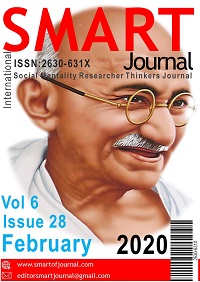Author :
Abstract
Godwin’in görüşleriyle şekillenen ve Proudhon ile ilk olarak açığa çıkan anarşizm düşüncesi, temelde Avrupa düşüncesi içinde şekillenmiştir. İnsanın doğasındaki iyiliğe güvenmek yardımlaşmayla ve dayanışmayla şekillenen toplumların, tahakküm ilişkilerini ortadan kaldıracağına inanmak anarşizmin ilk temel varsayımlarından olmuştur. Bu bağlamda Proudhon’un karşılıklılık ilkesi ve Kropotkin’in karşılıklı yardımlaşma ilkesi, Mauss ve Levi-Strauss’un antropolojik kuramlarıyla benzerlik ve uygunluk içindedir. Dolayısıyla 19. yüzyılda Avrupa’da otorite’lerin sorgulamasına girişen anarşizm, bir şekilde antropoloji bilimini ve bazı antropolojik kuramların gelişmesini de etkilemiştir. Bu yazının amacı da yardımlaşmayı, karşılıklılığı vurgulayan antropolojinin önemli kuramcılarından Mauss ve Strauss’un düşünce temellerini kurarken ne derecede Proudhon ve Kropotkin’den etkilendiğini göstermektir. Birçok Marksist düşünür ve sosyal bilimciyi de etkileyen ve yapısalcılığının ortaya çıkışında etkili olan bu düşünürlerin bahsedilen anarşist düşünürlerle hangi bağlamda örtüştükleri, farklılıklarının neler olduğu ele alınıp değerlendirilecektir.
Keywords
Abstract
Anarchism, which began to be shaped by Godwin's views and appeared for the first time with Proudhon, was basically shaped by European thought. Relying on the goodness of human nature and believing that societies based on mutual assistance and solidarity would eliminate hierarchy have been one of the first basic assumptions of anarchism. In this context, Proudhon's principle of reciprocity and Kropotkin's principle of mutual assistance have an interesting similarity and compatibility with the anthropological theories of Mauss and Levi-Strauss. Therefore, in the turbulent political environment of 19th-century Europe, anarchism, which attempts to question the Authorities, has in some way influenced the science of anthropology and the development of some anthropological theories. The aim of this paper is to show the extent to which Proudhon and Kropotkin were influenced by Mauss and Strauss, the important theorists of anthropology emphasizing cooperation and reciprocity while establishing the foundations of thought. In which context these thinkers, who also influenced many Marxist thinkers and social scientists and who were effective in the emergence of their structuralism, overlap with the aforementioned anarchist thinkers and what their differences are, will be held and discussed.
